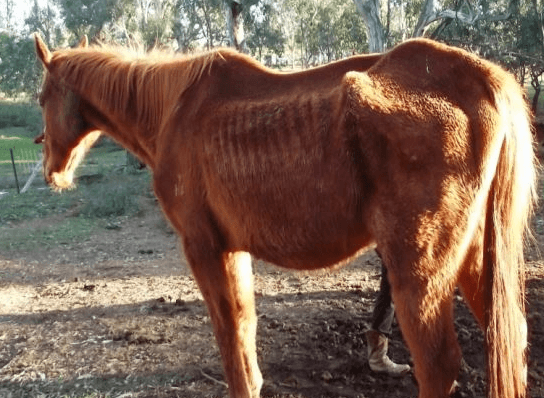If you are worried about a horse's health, contact Project Hope Horse Welfare Victoria (PHHWV) immediately on 1300 881 606
We have representatives across Victoria to take the call and talk through any concerns you have. We can provide advice and education to try and remedy problems before they escalate.
Horse neglect and abuse is an act of cruelty and needs to be called out. Together we can be the voice for these highly intelligent, sensitive and giving animals.
If you identify one or more of the following, report a horse:
Click to download the article by Dr Lesley Hawson titled "Spotting the Troubled Horse"



Today’s horses are living longer, this is due to a number of reasons including improvements in veterinary care, increased knowledge of equine nutrition and a lighter workload compared to horses from a century ago. Parasite control programs for horses have also improved enormously. Generally, a horse begins its golden years from 18-20 years of age. Because of the bodily changes associated with aging, older horses may require adjustments in health care, environment, and diet. Learn more about aged horses.
Did you know it is just as dangerous for a horse to be overweight as it is to be underweight? Horses evolved to live on sparse tough grass and to be able to run fast on specially designed legs. Carrying too much weight makes the horse likely to experience:
Learn more about founder and obesity in horses.
Accurately body scoring your horse is an important skill to learn as a responsible horse owner. Body scoring involves assessing the overall condition of your horse.
It is important to understand a horse’s body condition score (BCS) is not just about how much the horse weighs but also how fat is distributed. Horses with fat deposited on their rump, back, withers and neck are vulnerable to diseases such as laminitis and equine metabolic syndrome.
Learn more about body scoring and managing a horse weight.
Humane destruction is possibly the least discussed topic of horse ownership. Euthanasia is often be the most compassionate and kindest
outcome for a horse facing the issues that come with age. Every horse owner ought to give this matter considered thought so they
will be prepared when the time comes to ensure their beloved four legged friend has a dignified farewell.
It is difficult to accept death at any time. It can be painful and traumatic, therefore knowing how to prepare and manage such a situation is very important. Learn more about farewelling your horse.
Circumstances change for all of us and sometimes this means that you are no longer to care for your horse. As a horse owners, you have a responsibility to ensure that the welfare of your horse is not compromised and that can mean finding a new home or exploring other avenues to enable you to keep you horse.
We have put together some ideas that you may not have considered when you find your self in this situation. Learn more about rehoming your horse responsibly.